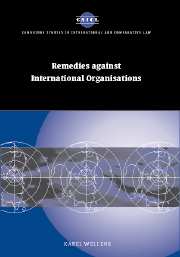Book contents
- Frontmatter
- Contents
- Acknowledgements
- List of abbreviations
- Introduction
- Part I General features of remedies against international organisations
- Part II Procedural aspects of remedial action against international organisations
- 7 Introduction to procedural aspects of remedial action against international organisations
- 8 Procedural aspects of remedial action by member states
- 9 Procedural aspects of remedial action by staff members
- 10 Procedural aspects of remedial action by private claimants
- 11 Procedural obstacles for representational non-governmental organisations
- 12 Procedural obstacles common to remedial action by non-state claimants
- Part III Substantive outcome of remedial action against international organisations
- Part IV Alternative remedial action against international organisations and options for the future
- Conclusion
- Bibliography
- Index
- CAMBRIDGE STUDIES IN INTERNATIONAL AND COMPARATIVE LAW
10 - Procedural aspects of remedial action by private claimants
Published online by Cambridge University Press: 13 July 2009
- Frontmatter
- Contents
- Acknowledgements
- List of abbreviations
- Introduction
- Part I General features of remedies against international organisations
- Part II Procedural aspects of remedial action against international organisations
- 7 Introduction to procedural aspects of remedial action against international organisations
- 8 Procedural aspects of remedial action by member states
- 9 Procedural aspects of remedial action by staff members
- 10 Procedural aspects of remedial action by private claimants
- 11 Procedural obstacles for representational non-governmental organisations
- 12 Procedural obstacles common to remedial action by non-state claimants
- Part III Substantive outcome of remedial action against international organisations
- Part IV Alternative remedial action against international organisations and options for the future
- Conclusion
- Bibliography
- Index
- CAMBRIDGE STUDIES IN INTERNATIONAL AND COMPARATIVE LAW
Summary
Section 29(a)–(b) of the General Convention on the Privileges and Immunities of the UN and the corresponding section 31(a)–(b) of the Convention on the Privileges and Immunities of Specialised Agencies require these international organisations to make provision for appropriate means of settlement. Pierre Klein rightly observed that given the rationale of this obligation, namely to respect the fundamental rights of the individual and to ensure a due process of law, it does impose itself on every international organisation even without special provisions. If by way of the holding-harmless clause the private claimant is directed towards the domestic legal system of the host state, then this implies the potential for additional, different procedural obstacles arising from that system's particular structure, for example with regard to the individual's judicial protection vis-à-vis national administrative authorities.
As has already been made clear above, member states do have access to a number of mechanisms to submit claims based on political or policy-related grievances against the UN, usually made in connection with actions or decisions taken by the Security Council or the General Assembly. When similar claims – often seeking substantial monetary compensation – are made by third parties, the UN is not willing to engage in litigation or arbitration because in the Secretary-General's view utilising public funds would be inappropriate to submit to any form of litigation.
- Type
- Chapter
- Information
- Remedies against International Organisations , pp. 88 - 105Publisher: Cambridge University PressPrint publication year: 2002

